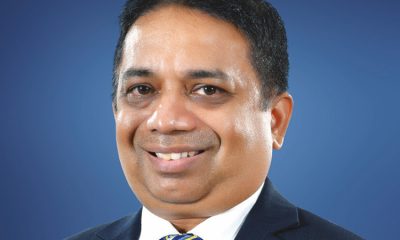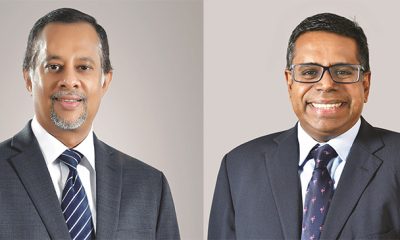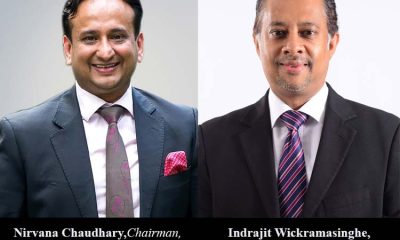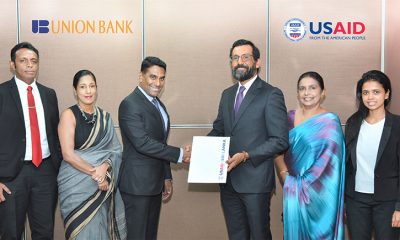Business
Union Bank records strong revenue growth in FY2022 despite challenges
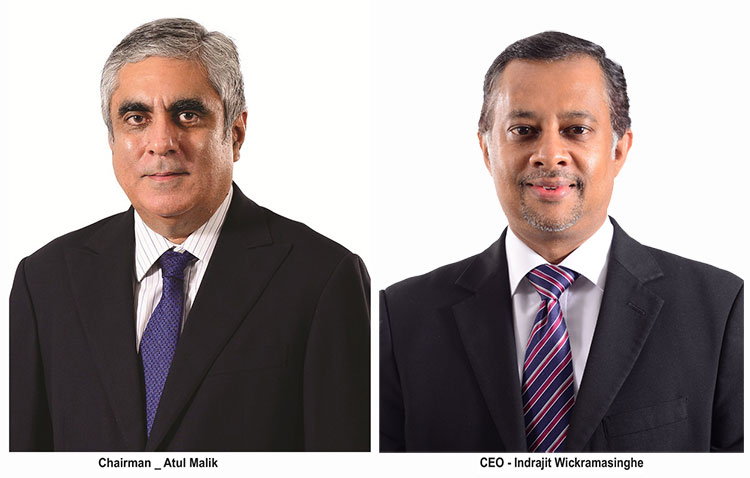
Union Bank continued to be resilient throughout 2022 leveraging on its strong capital position and remained agile, posting an increased overall income leading to an improved core-banking performance during the year. The Bank’s gross income for the year increased significantly by 73% to LKR 18,966 MN as a result of the Bank cautiously managing its businesses with a stringent risk and recovery framework, whilst selectively pursuing for new business opportunities.
Net Interest Income (NII) increased by 36.6% to LKR 5,814 MN as a result of improved yields from the repricing of the loan portfolio and treasury assets. Prudent management of interest expenses lead to an increase in the Net Interest Margin (NIM) by 116 bps. Net Fee and Commission Income increased by 32.8% to LKR 1,143 MN aided by increased activity from the trade business, remittances, credit, and debit cards. Other Operating Income also increased by 121% as a result of the foreign exchange income and gains.
As a result of the stresses stemming from the macroeconomic environment and further challenges to the settlement of loans due to continued pressures faced by impacted borrowers, compelled the Bank to prudently provide for increased impairments which impacted the Bank’s profitability. The impairment charge for the year was LKR 2,556 Mn, an increase of 174% compared to the corresponding period.
Despite prudent cost management initiatives, the Total Operating Expenses of the Bank increased to LKR 588 Mn, an increase of 16% over the corresponding period, impacted by the Rupee depreciation and the increase in utility tariffs.
Consequently, the results from operating activities were LKR 925 Mn and the Bank’s Profit Before all Taxes including its equity accounted share of subsidiaries for the year was LKR 788 Mn and the Bank’s Profit After Tax (PAT) was LKR 314 Mn for the year ended 31 December 2022.
The Total Assets of the Bank increased by 9.4% to LKR 129,483 Mn by 31 December 2022. With the contraction in private sector credit and lending opportunities, the Bank’s Loans and Advances at the end of the year was LKR 67,727 Mn. All business segments focused on expanding lending to existing customers and maintaining credit quality whilst pursuing selective lending opportunities during the year. The Bank secured a funding line from the Asian Development Bank (ADB) which aided further funding to SMEs to sustain and revive businesses. The Bank continued to support impacted customers with customised payment plans whilst extending the relief measures mandated by the Central Bank.
The Bank maintained a robust liquidity position both in LKR and FCY throughout the year. Customer deposits remained stable and increased by 11% to LKR 92,592 Mn aided by prudent deposit mobilization amidst rate revisions. The average CASA of the Bank remained healthy with a CASA ratio of 23% as of 31 December 2022. The Bank’s stage 3 loan ratio stood at 8.19%.
The Bank continued to maintain a robust capital adequacy position, well above the regulatory requirements and the Bank’s Total Capital Ratio was 18.26% as of 31 December 2022. During the year, the rating of the Bank was reaffirmed at BBB-(lka) with a Negative Rating Watch by Fitch due to the stresses in the operating environment.
The Union Bank Group, consisting of Union Bank of Colombo PLC, UB Finance Company Ltd., and National Asset Management Ltd., recorded a PBT amounting to LKR 991 Mn and a PAT of LKR 423 Mn for the year ended 31 December 2022. The Total Assets of the Group was LKR 136,679 Mn an increase of 10% with the Bank’s share amounting to over 95% noting that the group performance is propelled by the Bank.
The Bank acted with empathy in understanding the evolving needs of customers during a challenging year and remained committed to ensuring uninterrupted services with an enhanced focus on digital platforms. During the year, the Bank invested in several key digital transformation and IT infrastructure projects with a focus on improved security and reliability including the upgrade of the Data Centre and the ATM Switch. The Bank also connected to the LankaPay Online Payment Platform for IRD, Customs and Ports Authority payments and added Cargills FoodCity network of outlets for deposits and credit card payments through its Agent Banking service providing enhanced convenience to customers. The Bank also provided an enhanced range of services including onsite cheque printing through its cash management solution Union Bank BizDirect for ease of business operations of the SME and Corporate customers. During the year Union Bank continued to uphold its status in the LMD Most Valuable Brands in Sri Lanka and was also listed in the LMD Most Respected Entities.
Union Bank
Business
World Bank may convert infrastructure loans into tradable assets

A game-changer for Sri Lanka’s capital market
As the global community convened for the World Bank Group’s 2025 Spring Meetings under the timely theme “Jobs: The Path to Prosperity,” one message stood out: prosperity in the developing world depends not only on physical infrastructure but also on strong financial systems.
Among the influential voices at this year’s gathering was Douglas L. Peterson, Special Advisor to S&P Global and a longstanding advocate of resilient market economies.
Drawing from a decade-long tenure as CEO of S&P Global, Peterson delivered key insights that resonate deeply with the challenges and opportunities facing emerging economies such as Sri Lanka.
Peterson stressed that while global capital is abundant, it doesn’t move indiscriminately. “It follows signals, namely, data, transparency, regulatory certainty, labour and market stability.”
“When investors look to deploy capital in developing markets, they’re seeking a solid financial infrastructure,” Peterson said. “That includes reliable data, transparent pricing mechanisms, independent credit rating agencies, and clearly defined bankruptcy laws.”
These factors may not make headlines, but Peterson underscored their essential role.
“Financial infrastructure enables confidence, and confidence attracts investment,” he said.
A key initiative Peterson is championing in collaboration with the World Bank is titled ‘Originate to Distribute’, a structured finance approach where loans are created by institutions like the World Bank but sold to private investors.
Traditionally, loans from development banks remain on their balance sheets for decades. This initiative proposes standardising and structuring such loans so that private investors can purchase, pool, and trade them – essentially converting infrastructure loans into a new, tradable asset class.
“This is about creating velocity and scale,” Peterson said. “If the World Bank can originate loans and distribute them to the private sector, every dollar stretches further. It helps close the multi-trillion-dollar infrastructure investment gap.”
For countries like Sri Lanka, where public finances are under pressure, such a model could unlock significant private capital provided the regulatory environment and financial infrastructure are prepared to support it.
In alignment with the World Bank’s focus on job creation, Peterson prioritised five sectors he believes are pivotal for employment growth in developing nations: infrastructure (both physical and digital), agri-business, healthcare, tourism, and manufacturing. The common thread across all these sectors, he asserted, is infrastructure.
“Build an airport and you get hotels, transport services and even carbon savings,” Peterson said. “A bridge not only connects communities but also cuts costs, travel time, and emissions.”
According to Peterson, infrastructure investment yields a multiplier effect, often generating an additional $1.40 to $1.60 for every dollar spent. It also catalyses other industries. Manufacturing depends on roads and ports; tourism needs transport and energy; agriculture requires logistics and storage; and healthcare relies on reliable access and communication systems.
Peterson’s reflections also touched on a more structural issue that Sri Lanka is currently facing; the need to develop robust domestic capital markets. He emphasised moving beyond a banking-dominated financial system toward one that includes institutional investors like insurance companies and pension funds.
“These institutions become long-term investors,” he noted. “They form the foundation for sustainable infrastructure investment. Homegrown capital reduces reliance on external debt and increases financial resilience.”
Peterson’s remarks serve as a timely reminder as job creation and long-term prosperity in Sri Lanka will not come through piecemeal efforts. Instead, they require coordinated investments in both physical and financial infrastructure, from better roads and ports to regulatory frameworks that inspire investor confidence.
Unlocking private capital through trust, transparency, and smart financial engineering is the way forward. And as leaders like Peterson have shown, the tools and models already exist. It is now up to policymakers and financial leaders in Sri Lanka to ensure Sri Lanka is ready to embrace them.
Douglas L. Peterson currently serves on the board of the UN Global Compact and was formerly CEO of S&P Global, where he expanded the company’s market capitalisation from $16 billion to over $150 billion. He also led the G7 task force on sustainable finance in 2021.
By Sanath Nanayakkare
Business
AHK Sri Lanka facilitates business delegation to Intersolar Europe 2025
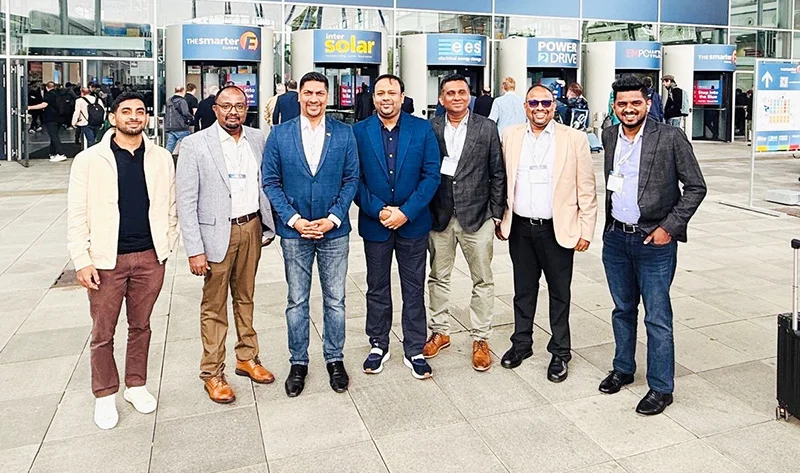
The Delegation of German Industry and Commerce in Sri Lanka (AHK Sri Lanka) successfully organized a visitor delegation to Intersolar Europe 2025, held from 7 – 9 May in Munich, Germany. Recognized globally as one of the most significant and comprehensive trade fairs dedicated to the solar industry, Intersolar serves as a premier platform for showcasing the latest innovations in renewable energy and sustainable technologies.
The Sri Lankan delegation comprised senior representatives from prominent companies in the sector, including Mega Solar, Micro PC Systems, Eco Solar Rays, and Puwakaramba Building Solutions, reflecting the country’s growing commitment to advancing renewable energy solutions.
The primary objective of this visit was to provide Sri Lankan companies direct access to the latest developments in solar technology, including sustainable energy solutions, energy storage systems, e-mobility, floating solar applications, agrivoltaics and recycling solutions. By connecting local enterprises with cutting-edge technologies and global industry leaders, AHK Sri Lanka aims to facilitate the adoption of modern energy solutions in Sri Lanka and support the nation’s broader transition to a more sustainable and energy-secure future.
A key highlight of the delegation’s agenda was a strategic meeting with the organizers of Intersolar Europe. This engagement provided valuable insights into the exhibition’s future vision and fostered discussions on potential collaboration opportunities between German and Sri Lankan stakeholders in the renewable energy sector.
Further amplifying the value of the delegation, AHK Sri Lanka coordinated over 25 tailored B2B meetings between Sri Lankan companies and German/European industry counterparts. These curated matchmaking sessions enabled participants to explore commercial opportunities, initiate technical partnerships, and lay the groundwork for future investments and joint ventures.
Business
Prime Group appoints Umaria Sinhawansa as Global Brand Ambassador

Prime Group, Sri Lanka’s leading real estate brand with a 30-year legacy and international branches in Australia and Dubai, has named celebrated Sri Lankan music icon Umaria Sinhawansa as its Global Brand Ambassador. This partnership unites two Sri Lankan powerhouses to showcase local talent and excellence worldwide.
The collaboration aims to strengthen Prime Group’s global expansion while promoting Sri Lankan culture. Umaria, who bought her first property from Prime Group a decade ago, expressed pride in representing the brand. Prime Group’s Co-Chairperson, Sandamini Perera, highlighted Umaria’s embodiment of Sri Lankan heritage and global appeal, aligning with their mission to elevate the country’s real estate innovation.
Together, they aim to inspire trust, connect with international markets, and celebrate Sri Lanka’s cultural richness on a global scale.
-

 Features4 days ago
Features4 days agoSAITM Graduates Overcome Adversity, Excel Despite Challenges
-

 News4 days ago
News4 days agoDestined to be pope:Brother says Leo XIV always wanted to be a priest
-

 Sports4 days ago
Sports4 days agoASBC Asian U22 and Youth Boxing Championships from Monday
-

 Foreign News5 days ago
Foreign News5 days agoMexico sues Google over ‘Gulf of America’ name change
-

 Opinion4 days ago
Opinion4 days agoDrs. Navaratnam’s consultation fee three rupees NOT Rs. 300
-

 Features3 days ago
Features3 days agoChampioning Geckos, Conservation, and Cross-Disciplinary Research in Sri Lanka
-

 Business4 days ago
Business4 days agoDilmah – HSBC future writers festival attracts 150+ entries
-

 Business4 days ago
Business4 days agoBloom Hills Holdings wins Gold for Edexcel and Cambridge Education



